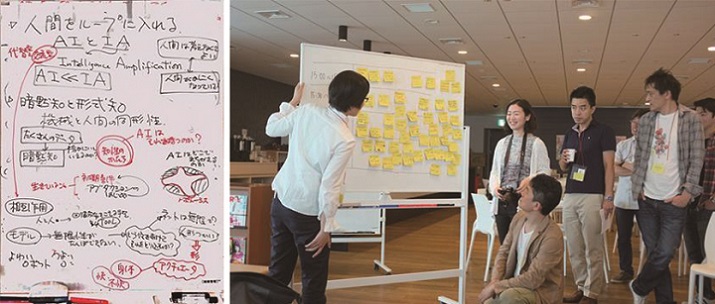TSUKUBA FUTURE
#063 Does the Web Evolve!?
Associate Professor OKA Mizuki, Faculty of Engineering, Information and Systems

The British computer scientist Tim Berners-Lee proposed the World Wide Web (www) a quarter of a century ago, in 1989. It has since become thoroughly embedded in society and has given rise to a number of social phenomena. In 2006 Berners-Lee proposed a new field of research known as web science, a field which Prof. Mizuki Oka is working to develop.
We see people using mobile phones and smart phones everywhere—in the street and on public transport, and it is the World Wide Web, known as "the web" for short, which has supported the dramatic rise in popularity of smart phones. Proposed in 1989, it is now more than a quarter of a century since the web went live in 1990. The first websites were extremely simple, but nowadays, social media, shopping websites, banking websites and more, play an important role in many aspects of our lives. Even in the pre-social media analog days, people often said it was a small world. The concept of "six degrees of separation," based on the work of psychologist Stanley Milgram, whereby anybody in the world can be reached through a "chain" of six acquaintances on average, was a shocking discovery. Using Facebook's exhaustive social networking data, it was proven in 2011 that people are connected by chains of fewer than six links. It is beyond the scope of computer science to analyze what is happening in contemporary society in this age when computers collate data about human connections and behaviors, as it requires a complex fusion of sociology, psychology and economics. This is web science, proposed in 2006 as the multidisciplinary study of the web, or rather as the way in which the web should be studied. Prof. Oka launched the Web Science Research Lab in 2015.
The now complex web, with its entangled multitude of interactive services, has been eliciting unexpected responses. The web itself can be seen as having become a natural phenomenon, a global ecosystem. For example, if we look at social media, we see that it has become far more diverse, with different sites serving different purposes—blogs, Twitter, Facebook, Instagram, Snapchat, and others. Who could have foreseen this? Prof. Oka, who likens these trends to the evolution of organisms in ecosystem, analyzes them using a range of statistical methodologies and machine learning techniques, in order to elucidate web evolution mechanisms. Of course, evolution of the web is different from organism evolution in that there is no generational shift, so it is not evolution in the true sense of the word. In biological evolution, an extinct species cannot be revived, whereas deleted web services and pages can of course be reintroduced. However, under Prof. Oka's methodology, evolution is argued as an analogy, with the copying of service methods and information seen as reproduction, and errors in copying as mutations. Behaviors of services and information, which are seen as "artificial life forms" within the web ecosystem, are analyzed to see how they were came about, how they have evolved, and how they will evolve, using not only computer science, but also perspectives from the fields of mathematics, sociology, psychology, economics, political science, biology and art. As a first step, Prof. Oka brought together a group of people from a wide range of fields and launched the research community known as ALife Lab.

Prof. Oka's research field is the ecosystem known as the web.
The name ALife is derived from "artificial life". A real life form is motivated by its need to reproduce, a motivation which artificial systems do not have. But what if an artificial system were given this motivation artificially? It may start to drive out other systems. Or it may start to brainwash the humans who are using it. It may sound Orwellian, but targeted advertising based on a customer's browsing and shopping history, including news customized to the predilections of the user is the daily bread and butter of mail order websites. Just by looking for information you are triggering mechanisms which subconsciously guide you toward particular products. Prof. Oka predicts that the need to discuss how artificial intelligence (AI) and artificial life (ALife) should be nurtured will be evident in the near future. The aim of web science is to turn the web, which can create new social problems, into a new culture. This was Prof. Oka's aim in establishing her think-tank cum research lab—a group of experts from a wide range of fields who discover social problems and propose solutions. ALife Lab is the first step in this process.

Discussions take place in a real space, and information is shared in a virtual space.
Article by Science Communicator at the Office of Public Relations


